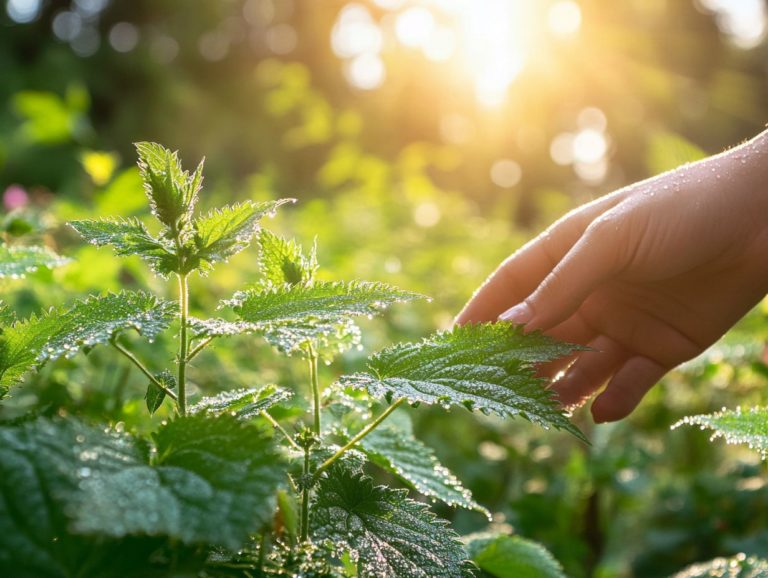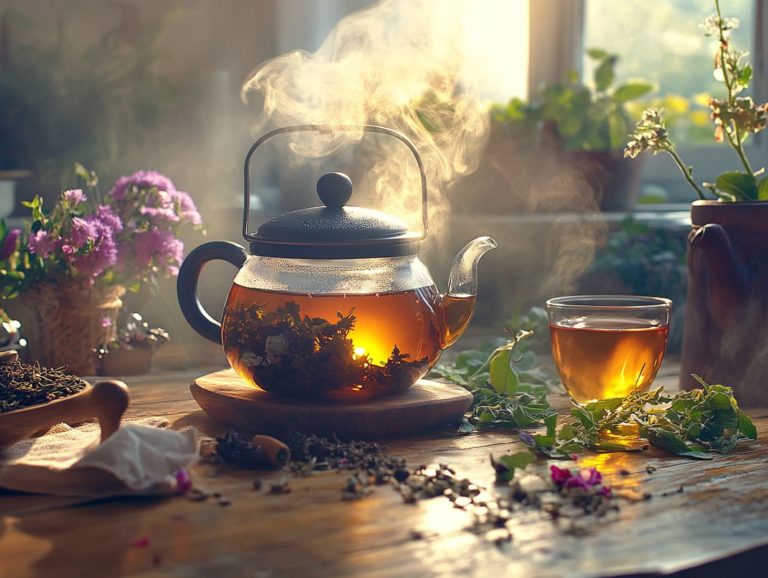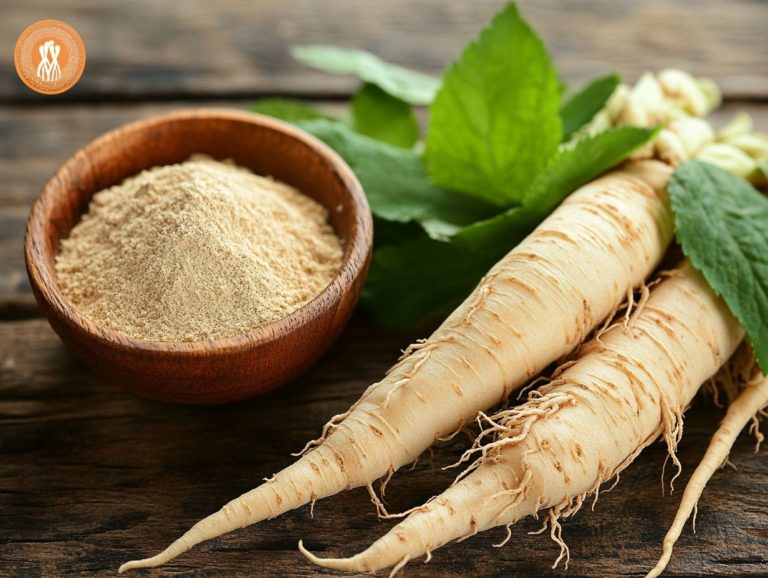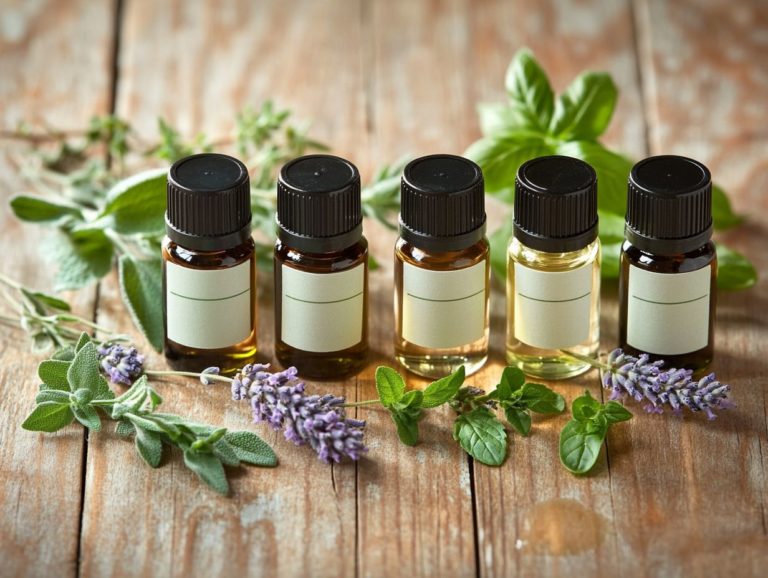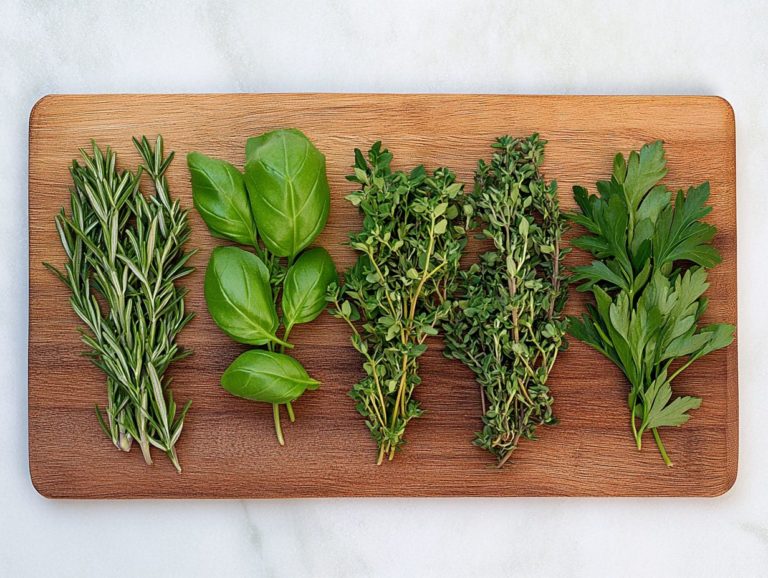How to Safely Use Essential Herbs
Essential herbs have been cherished for centuries, providing a treasure trove of benefits that enhance both physical and mental well-being. This exploration delves into what essential herbs are and highlights their remarkable advantages, from boosting immunity to elevating your mood.
When utilizing these powerful plants, it’s vital to navigate their use safely, as there can be potential risks and interactions to consider. You ll learn about proper methods of administration, recommended dosages, and how to select high-quality herbs that meet your needs.
Dive in now to uncover how essential herbs can transform your life!
Contents
- Key Takeaways:
- Benefits of Using Essential Herbs
- Safety Considerations for Using Essential Herbs
- How to Properly Use Essential Herbs
- Choosing High-Quality Essential Herbs
- Frequently Asked Questions
- What are essential herbs and why are they beneficial for health?
- How can I safely use essential herbs?
- What are some common essential herbs and their uses?
- Can essential herbs interact with medications?
- Are there any safety precautions I should take when using essential herbs?
- Are there any potential side effects of using essential herbs?
Key Takeaways:
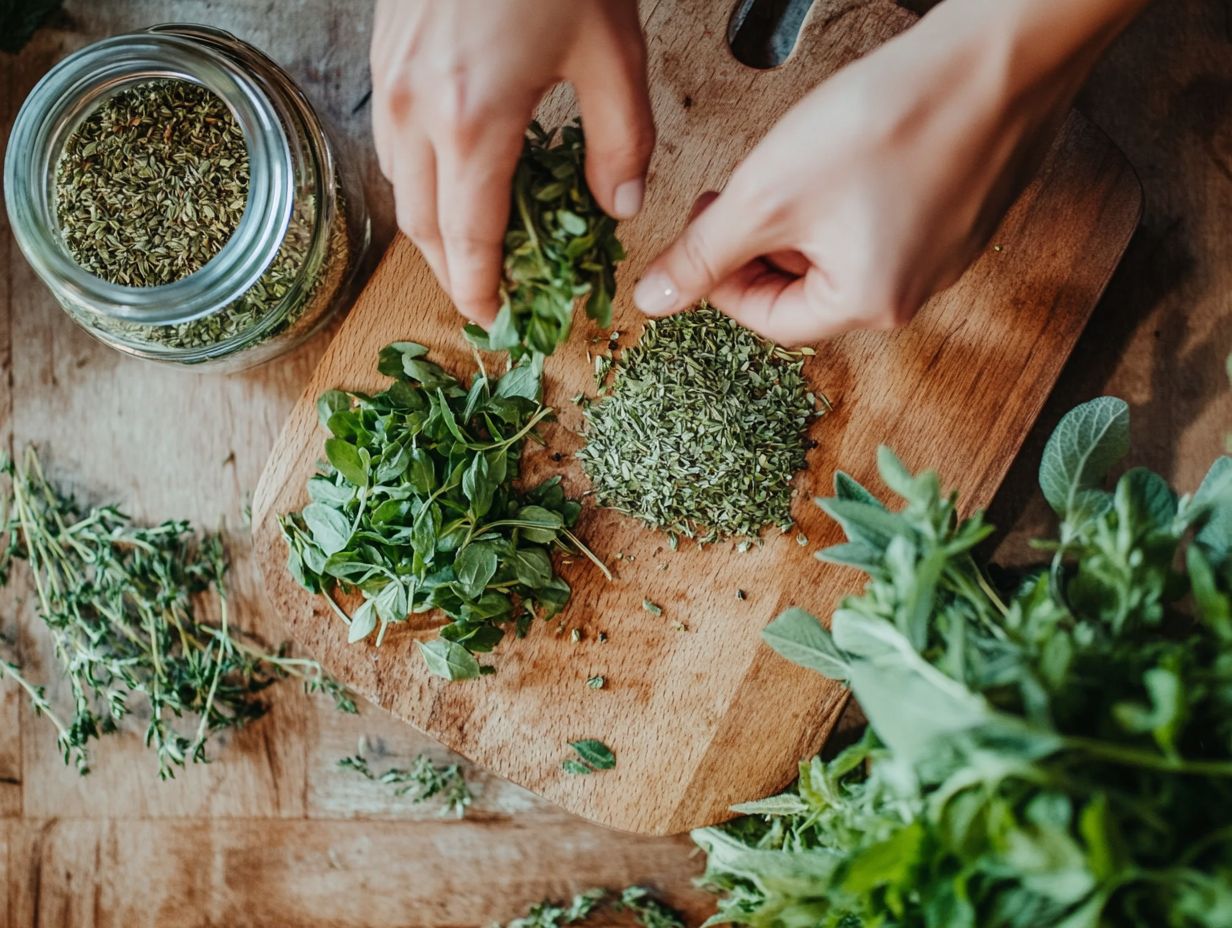
- Always research and understand the potential risks and interactions of essential herbs before use.
- Consult with a healthcare professional before incorporating essential herbs into your routine, especially if you have any underlying health conditions.
- Choose high-quality essential herbs from reputable sources to ensure safety and effectiveness.
What are Essential Herbs?
Essential herbs hold a pivotal position in both traditional and modern herbal medicine. They serve as concentrated plant extracts that capture the therapeutic benefits of various botanicals, including renowned examples like lavender and tea tree.
You ll find that these potent oils are frequently employed in aromatherapy. They are designed to enhance your emotional well-being, support your physical health, and provide a delightful sensory experience through their captivating aromas.
Historically, essential herbs have been esteemed across cultures for their healing qualities. They were utilized in ancient practices to foster balance and wellness. Extracted from specific plant materials through methods like steam distillation (a method where steam helps extract oils from plants) or cold pressing, these extracts encapsulate the very essence of their sources, making them essential resources in natural remedies.
Their uses extend far beyond mere fragrance; they can influence emotional states, alleviating stress, anxiety, and even physical discomfort.
Whether you re indulging in soothing diffusers or applying restorative topical oils, these herbs continue to connect age-old traditions with contemporary healing practices, embodying the enduring bond between humans and the natural world.
Benefits of Using Essential Herbs
Using essential herbs can provide you with a wealth of health benefits.
They can enhance your mood and offer support for mental health challenges such as anxiety and depression. These herbs can also help alleviate symptoms of insomnia while boosting your immune function.
Embracing these natural remedies can lead to a more balanced and resilient state of well-being.
Physical and Mental Health Benefits
Essential oils such as lavender, tea tree, and peppermint are celebrated for their remarkable benefits to both physical and mental health.
They offer relief from stress, treat skin irritations, and enhance respiratory function.
Lavender oil, in particular, is often lauded for its soothing qualities. It is a go-to choice for those looking to enjoy a restful night s sleep or ease anxiety. In contrast, tea tree oil stands out for its antimicrobial prowess, effectively tackling skin concerns like acne and infections.
Then there’s peppermint oil, infused with menthol. It can invigorate your mind and sharpen mental clarity, making it a fantastic ally during those sluggish moments or when you need to concentrate.
Each of these natural remedies not only addresses specific issues but also promotes an overall sense of well-being, showcasing the transformative power of essential oils in holistic health practices.
Safety Considerations for Using Essential Herbs
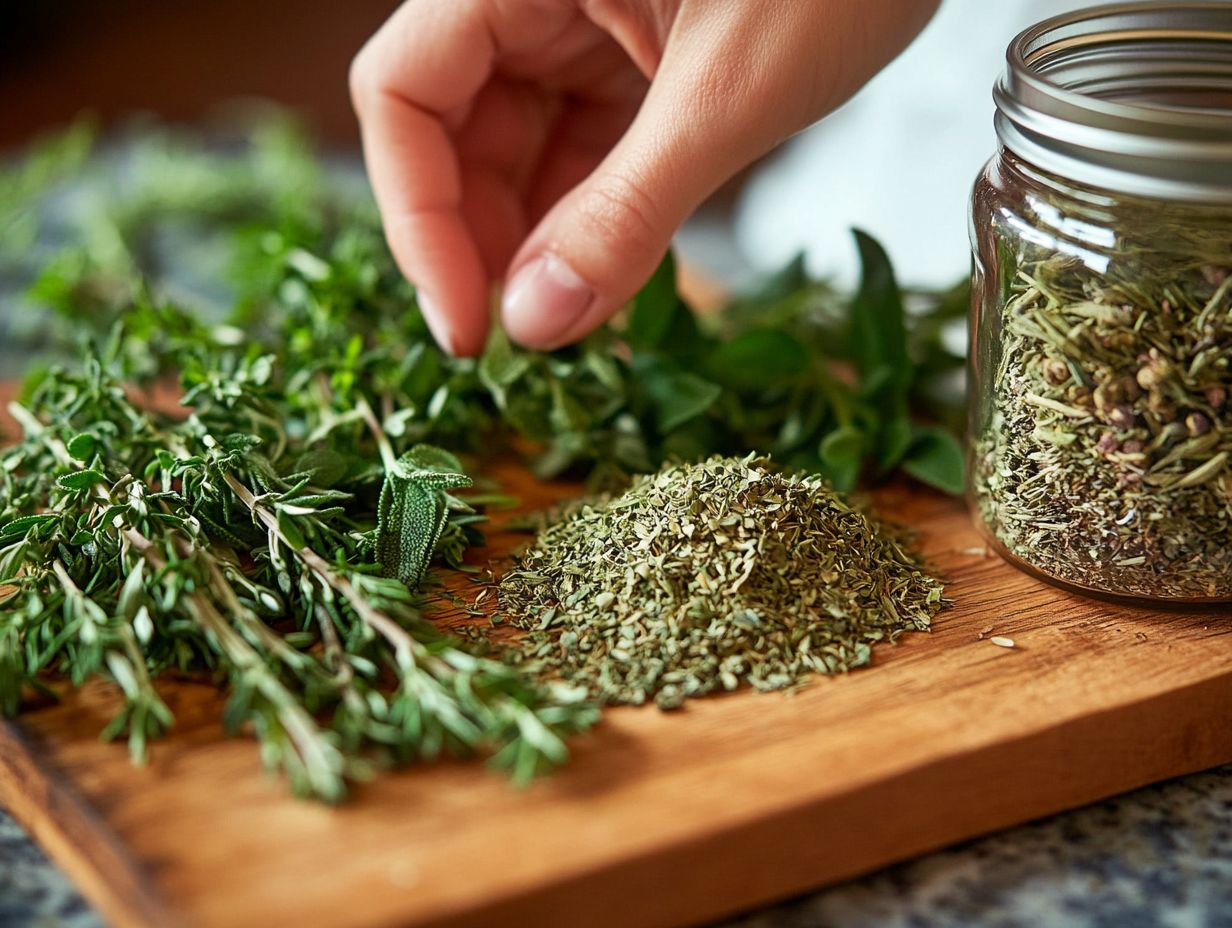
When you incorporate essential herbs into your routine, it’s vital to follow guidelines on how to use herbal remedies safely to prevent any adverse effects, such as skin irritation or allergic reactions.
Following proper dilution guidelines will not only keep you safe but also enhance the therapeutic benefits. This allows you to fully harness the power of these remarkable botanicals.
Potential Risks and Interactions
Potential risks associated with essential oils include hormonal effects and adverse side effects. It’s vital to avoid ingestion due to their concentrated nature. Understanding their chemical composition is essential.
Be cautious! These powerful substances can interact with your medications, potentially diminishing their effectiveness or causing harmful side effects. For instance, certain essential oils might amplify the effects of blood thinners or disrupt hormonal therapies. Exercise careful consideration.
Researching appropriate dosages and following safety measures is essential, especially when applying oils topically or using them in aromatherapy. Responsible usage means consulting healthcare professionals, particularly if you have pre-existing conditions or are on medication. This way, you can ensure that essential oils enhance your well-being rather than compromise it.
How to Properly Use Essential Herbs
Mastering the proper use of essential herbs requires basic knowledge of different ways to use herbs. This includes topical application, diffusion in aromatherapy, and using carrier oils oils used to dilute essential oils for safe application.
Methods of Administration
You have several methods for administering essential herbs, including aromatherapy techniques like diffusion and the topical application of essential oil blends. These methods harness the power of natural remedies effectively.
Each method offers unique benefits tailored to your individual needs. For example, diffusion purifies the air and creates a calming atmosphere, perfect for reducing stress and enhancing emotional well-being. Meanwhile, applying essential oils to your skin provides localized relief consider chamomile for soothing irritation or lavender for relaxation.
Incorporating these methods into your routine can significantly enhance your overall wellness, combining the power of nature with mindful practices. By understanding and utilizing these techniques, you can discover the best ways to integrate essential herbs into your life.
Recommended Dosages and Frequency
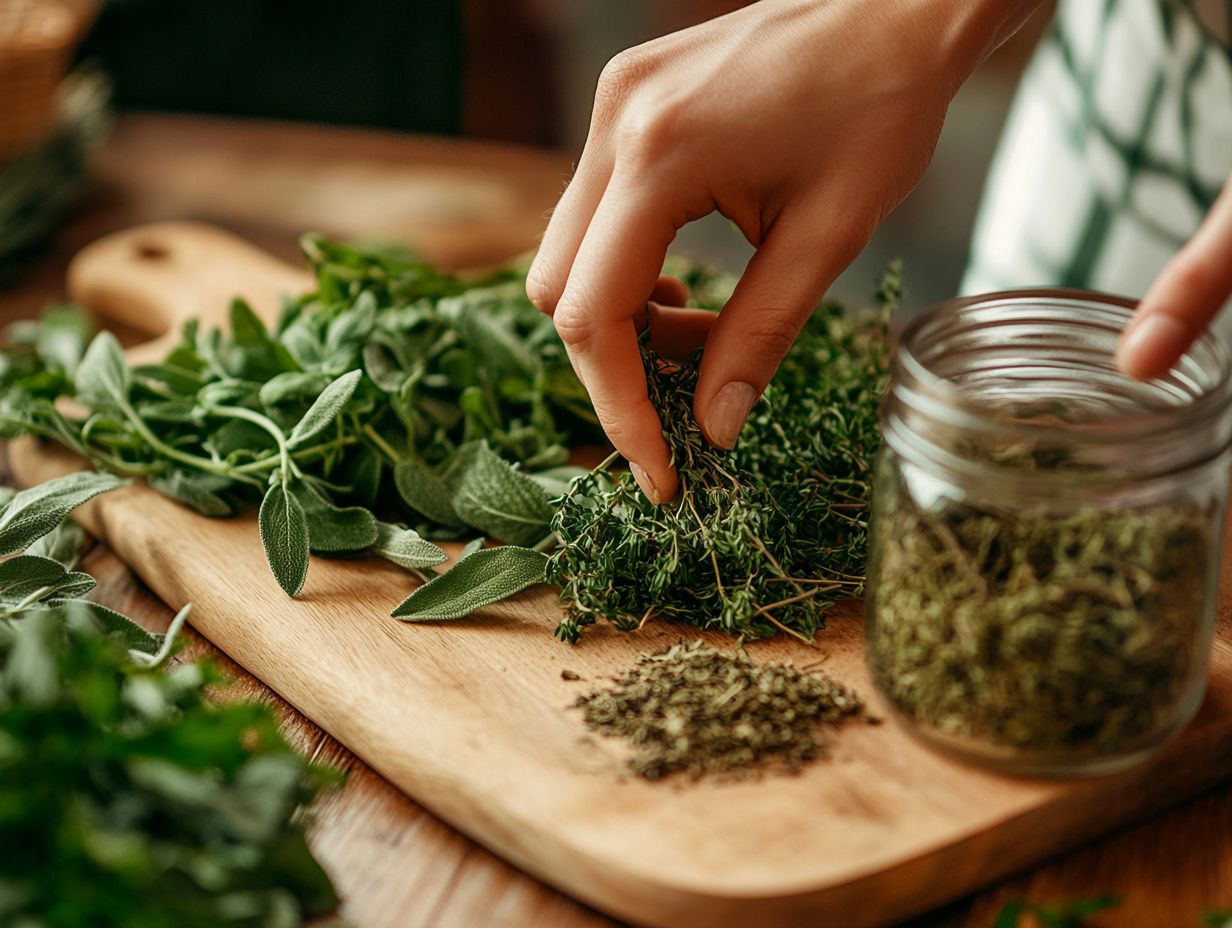
Understanding the recommended dosages and frequency of application is essential to unlock the amazing benefits of essential herbs while ensuring both safety and effectiveness. This is especially important when using essential oils, as factors like age, health conditions, and individual sensitivities can greatly impact the appropriate dosage.
For instance, younger individuals or those with specific health concerns may need to follow stricter dilution guidelines to avoid adverse reactions. The quality of the essential oils you choose also matters significantly; pure, high-quality oils typically possess more potent properties, making careful measurement essential for achieving the desired therapeutic effects while minimizing risks.
By adhering to these dosage recommendations, you enhance the overall efficacy of essential oils and create a safer experience for yourself and others. Check with a healthcare professional to find the right dosage for you!
Choosing High-Quality Essential Herbs
Selecting high-quality essential herbs is vital for unlocking their full therapeutic potential. Pay careful attention to key factors like purity, sourcing, and appropriate storage methods.
By making informed choices, you can maximize the benefits these herbs offer.
Factors to Consider When Purchasing
When you re in the market for essential oils, consider factors like chemical composition, sourcing, and quality labels. These elements are crucial for determining both efficacy and safety.
Understanding these factors can elevate the benefits you receive from aromatic extracts. The sourcing of essential oils includes the geographical location and cultivation methods of the plants, which influence their purity and potency.
Quality labels, often backed by third-party testing, give you peace of mind regarding the absence of contaminants and the overall integrity of the product.
The intricate mix of chemicals varies by plant species and environmental conditions. This factor is vital as it directly impacts therapeutic properties and effectiveness.
By being mindful of these aspects, you enable yourself to make informed choices. This way, you can select high-quality essential oils that align perfectly with your needs.
Frequently Asked Questions
What are essential herbs and why are they beneficial for health?
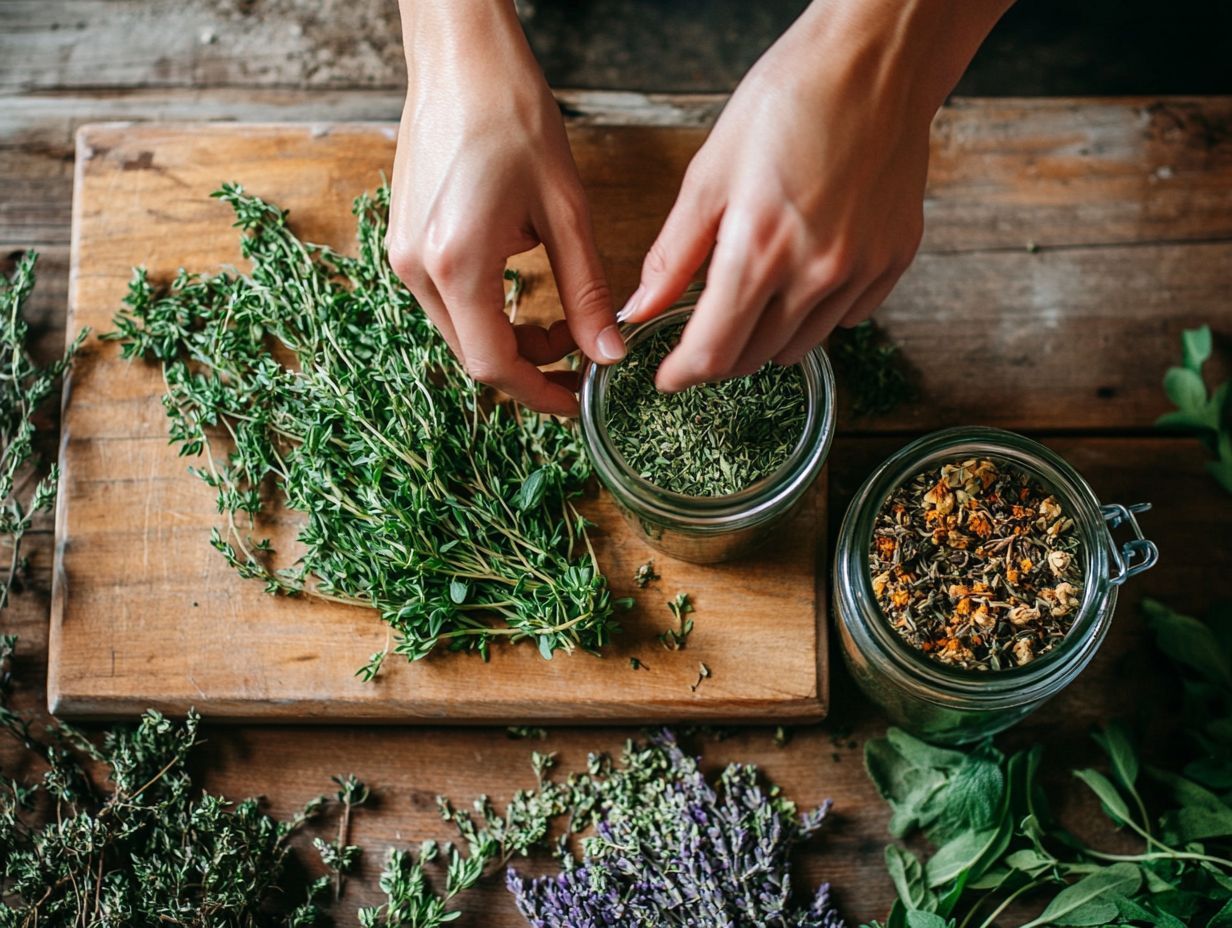
Essential herbs are natural plants with medicinal properties. They are commonly used in alternative medicine practices and contain concentrated amounts of nutrients, antioxidants, and other compounds that can improve overall health and well-being.
How can I safely use essential herbs?
Always chat with a healthcare professional before diving into essential herbs! They can provide guidance on appropriate dosages, potential interactions with medications, and any side effects.
It s also important to purchase high-quality herbs from trusted sources.
What are some common essential herbs and their uses?
Some common essential herbs include turmeric, ginger, garlic, chamomile, peppermint, and lavender. Turmeric is known for anti-inflammatory properties.
Ginger is used for digestion and nausea relief, while garlic has antibacterial and antiviral properties. Chamomile is often used for relaxation and stress relief.
Peppermint is known for its soothing effects on the digestive system, and lavender is commonly used for relaxation and sleep improvement.
Can essential herbs interact with medications?
Yes, essential herbs can potentially interact with certain medications. For example, St. John’s Wort can interact with antidepressants, and ginger can affect blood thinners.
It s essential to inform your healthcare provider of any herbs you are taking to avoid potential interactions.
Are there any safety precautions I should take when using essential herbs?
Yes, some essential herbs may not be safe for pregnant or breastfeeding women, children, or individuals with certain health conditions. Always read the labels and consult with a healthcare professional before use.
Start with small doses and monitor any potential side effects.
Are there any potential side effects of using essential herbs?
While essential herbs are generally safe when used properly, they may cause side effects in some individuals, such as stomach upset or allergic reactions.
If you experience any adverse effects, stop using the herb immediately and contact your healthcare provider.

